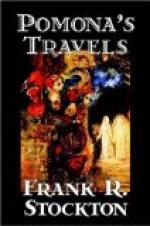I found the family-tree-man, whose name was Brandish, in a small room not too clean, over a shop not far from St. Paul’s Churchyard. He had another business, which related to patent poison for flies, and at first he thought I had come to see him about that, but when he found out I wanted to ask him about my family tree his face brightened up.
When I told Mr. Brandish my business the first thing he asked me was my family name. Of course I had expected this, and I had thought a great deal about the answer I ought to give. In the first place, I didn’t want to have anything to do with my father’s name. I never had anything much to do with him, because he died when I was a little baby, and his name had nothing high-toned about it, and it seemed to me to belong to that kind of a family that you would be better satisfied with the less you looked up its beginnings; but my mother’s family was a different thing. Nobody could know her without feeling that she had sprung from good roots. It might have been from the stump of a tree that had been cut down, but the roots must have been of no common kind to send up such a shoot as she was. It was from her that I got my longings for the romantic.
She used to tell me a good deal about her father, who must have been a wonderful man in many ways. What she told me was not like a sketch of his life, which I wish it had been, but mostly anecdotes of what he said and did. So it was my mother’s ancestral tree I determined to find, and without saying whether it was on my mother’s or father’s side I was searching for ancestors, I told Mr. Brandish that Dork was the family name.
“Dork,” said he; “a rather uncommon name, isn’t it? Was your father the eldest son of a family of that name?”
Now I was hoping he wouldn’t say anything about my father.
“No, sir,” said I; “it isn’t that line that I am looking up. It is my mother’s. Her name was Dork before she was married.”
“Really! Now I see,” said he, “you have the paternal line all correct, and you want to look up the line on the other side. That is very common; it is so seldom that one knows the line of ancestors on one’s maternal side. Dork, then, was the name of your maternal grandfather.”
It struck me that a maternal grandfather must be a grandmother, but I didn’t say so.
“Can you tell me,” said he, “whether it was he who emigrated from this country to America, or whether it was his father or his grandfather?”
Now I hadn’t said anything about the United States, for I had learned there was no use in wasting breath telling English people I had come from America, so I wasn’t surprised at his question, but I couldn’t answer it.
“I can’t say much about that,” I said, “until I have found out something about the English branches of the family.”
“Very good,” said he. “We will look over the records,” and he took down a big book and turned to the letter D. He ran his finger down two or three pages, and then he began to shake his head.




